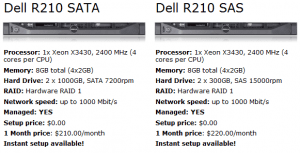How Does the Next Generation of Hosting Services Improve Your Site?

The commonly known HDD (Hard Disk Drive) slowly, but surely, goes down in the history of storage devices. Although HDDs have a capacity range of 500GB to 4TB and are highly affordable, their successor SSD (Solid State Drive) is taking the lead in the world of hosting because of its extremely fast performance as well as the speed of data transfer. SSD hosting is currently the most up-to-date website hosting platform. There are many advantages it has compared to classic hosting, which will be discussed later in this article.
What Is the Essential Difference Between SSDs and Traditional Hard Drives?
Traditional hard drives work by storing data on multiple disks that spin extremely fast. This mechanical action allows the data to be properly recorded and used as needed. Yet, despite all the advancements it has undergone over the years, their mechanics continue to operate on principles that emerged decades ago, which means that data transmission is slow. Consequently, if you’re planning a business that’s supposed to bring a lot of visitors to your website, standard hosting won’t meet these requirements.
Unlike traditional drives, SSDs store data on their microchips. Since there are no mechanically moving components, there’s virtually no delay in transmitting data and fulfilling read/write requests. SSD hosting is based on a storage system consisting of a large number of high-performance SSDs. So, in case the website for your business requires high performance, fast response time, and data access, SSD web hosting will best serve you for your new domain.
In case your website contains DMCA (Digital Millennium Copyright Act) protected content, you’ll need to find DMCA ignored hosting providers whose features include SSD technology. Most of them set different policies regarding the content they allow and ways of reacting to copyright notices. DMCA ignored hosting providers are mainly located offshore and will react not only to takedown notices but also to any attempt of a hacking attack.
Some of the many advantages of SSD over standard hosting are:
- Speed of reading and writing to disk
- Faster disk response
- 100x larger number of IOPS (Input/Output Operations Per Second – number of simultaneous reading and writing)
- A smaller percentage of cancellations
- Less heat, power consumption, and CPU usage
Why Is Faster Disk Response Essential for the Work of Your Website?
Every promising business nowadays has a thoroughly built website and Internet presentation. On the other hand, online users today don’t have the patience while sitting in front of their computers and simply require as fast access as possible to all the information they seek. It’s up to you to give them that, and the only way is that you choose hosting service that’ll be able to fulfill all the requirements. Otherwise, you won’t have much success. Most importantly, if you have an SSD hosting, your website will load much faster when people search it and database functions will run at an enviable level.
Furthermore, Google’s search algorithm has metrics that constantly rank your website. The speed of your website’s loading also has a lot of influence on whether you’ll come out on the first page when people search you, or on another page which people rarely visit. A quality website with good content and design is the basis for developing an online business plan, but the speed of the disk will greatly influence how much Google will help you reach more people. That’s where an impact of SSD hosting to SEO comes into the game.
SSD Hosting and SEO Optimization
By migrating your website to SSD hosting, you actually migrate your files and database to SSD storage and state-of-the-art server infrastructure, thereby, accelerating website by 50% or more. The more complex the website, the larger the advantages of SSD hosting are. The web applications that are more complex and websites with large databases will load multiple times faster. All of this leads to a shorter loading time for the website, which is especially appreciated by Google when ranking websites in search results.
Simply, if you want your website to have the best possible SEO and to be ahead of your competition, it’s essential that you have the shortest possible website load and the fastest response time. Your website can improve ranking in Google search results just by switching to fast SSD hosting.
How Much Energy Does the SSD Consume and Why Is It so Reliable?
The energy consumption is another area where SSD is leading the way compared to traditional drives. On average, they consume about 70% to 80% less power than a single SATA (Serial Advanced Technology Attachment) hard drive. In addition, the SSD operates at a much lower temperature because there’s no mechanical action that generates heat and, consequently, needs less time to cool down.
Reliability? For starters, SSD isn’t made up of moving parts. Traditional hardware contains elements that, through their mechanical action, lead to faster degradation. Some of the best hosting providers offer devices that have guaranteed run of about 2 million hours, while by comparison, traditional hard drives have a lifespan of around 700,000 to one million hours.
For Whom Is SSD Hosting Intended?
Without any dilemmas, we can recommend SSD hosting to anyone. Price is slightly higher than traditional hosting, but the operation of websites is incomparably faster, therefore, the user experience is significantly better. Also, the control interface that it SSD hosting uses, cPanel, is certainly top-notch when it comes to web hosting. The intuitive user interface, as well as a large number of available website administration tools, make it the most popular web control panel for the administration of domains and websites under SSD hosting.
SSD hosting is ideal for:
- E-shops
- Websites with large databases
- Websites with a high number of user visits
- Websites that are demanding when it comes to reading and writing data to disk
- Most popular CMS platforms (WordPress, Joomla, Drupal…)
- Classic HTML presentations
Cloud SSD Hosting for More Demanding Users
Cloud SSD hosting is usually the choice of demanding users, those who don’t satisfy their needs with ordinary SSD web hosting or develop their own applications. Cloud servers combine all the benefits of physical servers with the advanced capabilities of the Cloud environment. In any case, the user leases and pays as many resources as he/she needs, and if the need to increase the resources arises, it’s possible to expand the memory, storage, number of processors, etc. with only one click. Cloud SSD hosting runs on super-fast SSD storage. You can also manage your Cloud server on mobile devices using the specifically built apps, which give you full access to the server.
There’s really no good or bad choice, only the advantages and disadvantages. Before choosing your hosting plan, think carefully about what’s more important to you: lots of storage for little money, or high performance at a higher cost. Both options are actually only good but only if they serve their purpose.







